HEPATITIS TREATMENT IN WARTIME!


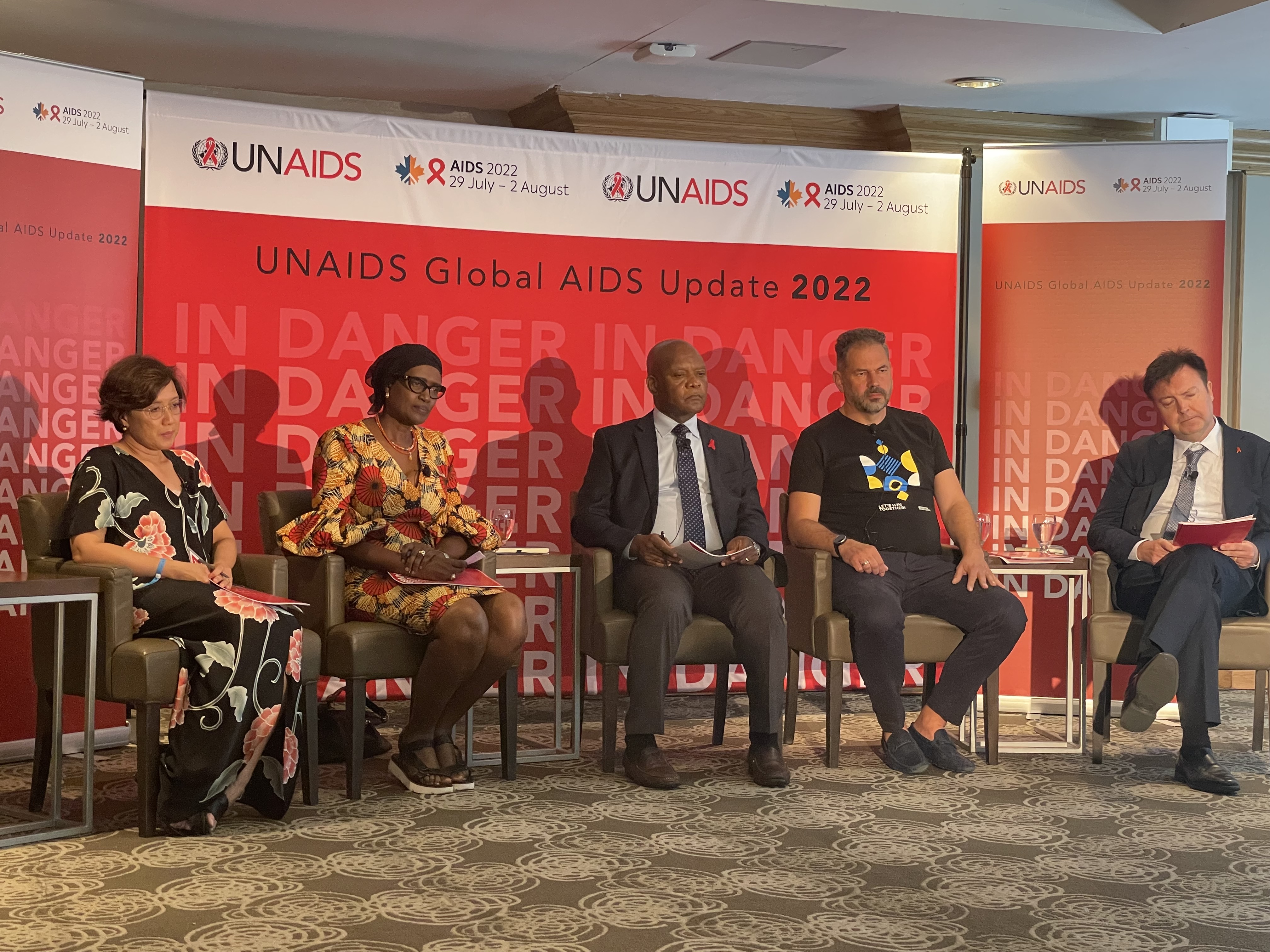
The Joint United Nations Programme on HIV/AIDS (UNAIDS) launched its annual report on the state of the global HIV response today ahead of AIDS 2022, the 24th International AIDS Conference, in Montreal, Canada, at a live event also livestreamed at www.unaids.org.
“For the 1st time UNAIDS releasing a global AIDS report with such alarming title – “In Danger”. This report is call for action. “I’m from Ukraine, the country facing Russian invasion. And for us it’s absolutly clear that being “In Danger” requires immediate and strong actions,” Andriy Klepikov, Executive Director of the Alliance for Public Health, said. “The report shows the fundamental mismatch. While we facing increase in new HIV infections, funding for HIV is decreasing. It is the exact time to highlight that future of AIDS response in the coming years will depend on successful The Global Fund replenishment, on raising at least 18 billion USD. Fight for what counts – this is true priority; this is very appealing to all of us in Ukraine. The report highlights the role of key populations. 70% of new HIV infections linked to key populations. That is where the funding should go. Invest times more in programs for people who use drugs, SW, MSM, transgender people.We are hoping for increased PEPFAR funding, and of course, funding to UNAIDS.”
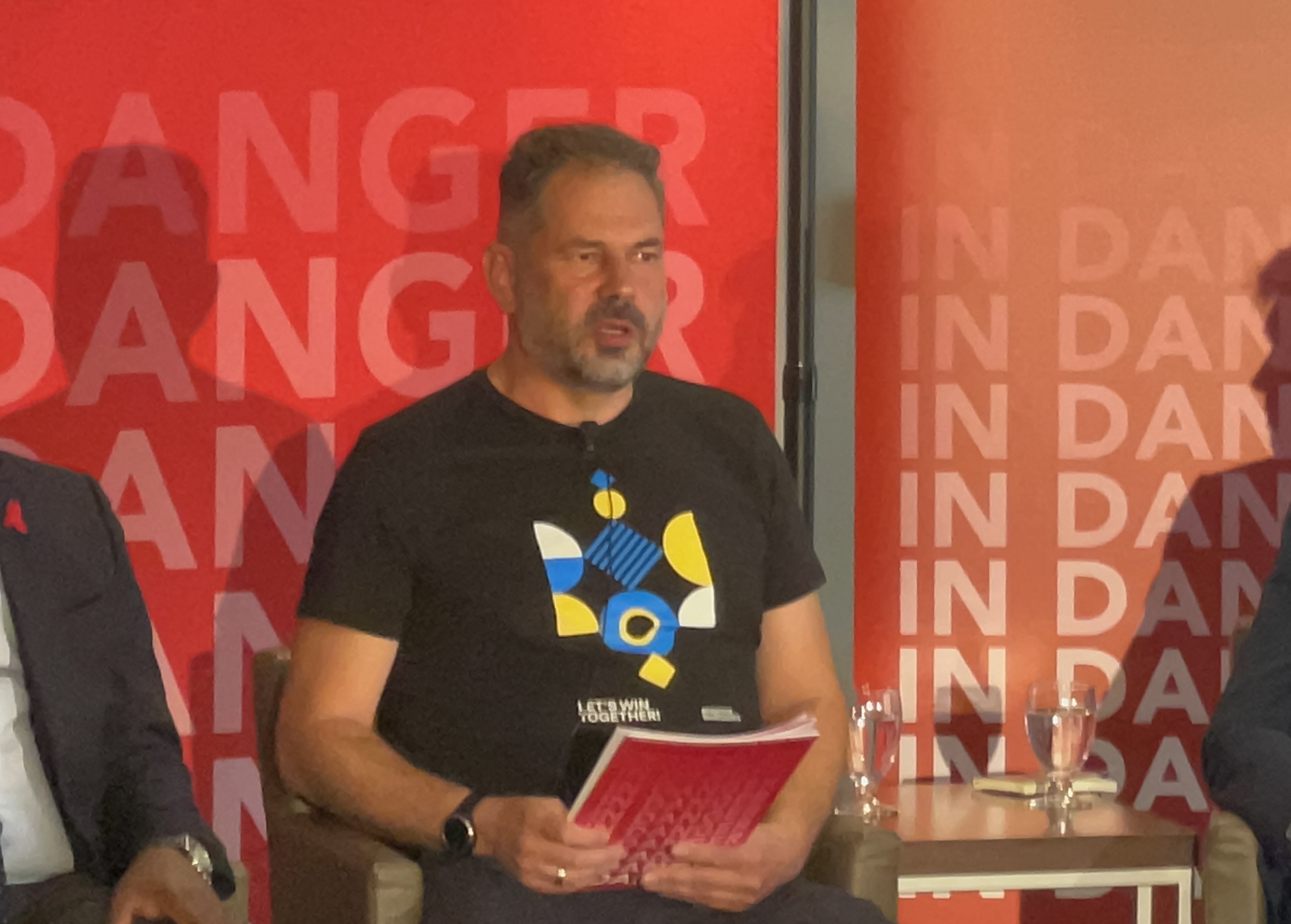
Russian war in Ukraine brought incredible challenges. 100 000 PLWH used to leave in the territories directly affected by the war. We have 15 million IDPs and war refugees. UN forecasts are terrible – 9 out of 10 Ukrainians will face poverty by the end of the year. GDP will fall by 30%
Loses for health system are so severe. At the same time war demonstrated that in situation of the destructed health infrastructure civil society and community are the backbone for HIV response.
“In many difficult situation, when others say “no” civil society say “yes”. Social workers, case managers continue regular contacts with patients. Civil society did delivery of ART, procured by PEPFAR and Global Fund. For example we did emergency procurement, and with our vans we did delivery of opioid substitution therapy medicines, over 1 million tablets to the areas government logistic company refused to go due to risks. We did it! Civil society has motivation. Let’s be quick and effective. Together we will win!”
The proven package for success includes; community-led, people-centred services; the upholding of everyone’s human rights, the removal of punitive and discriminatory laws, and the tackling of stigma; the empowerment of girls and women; equal access to treatment including new health technologies; and health services, education, and social protection for all.
UNAIDS data now show progress in prevention and treatment is faltering around the world, putting millions of people in grave danger. Action to tackle the inequalities driving AIDS is urgently required to prevent millions of new HIV infections this decade and to end the AIDS pandemic.
Globally the number of new infections dropped only 3.6% between 2020 and 2021, the smallest annual decline in new HIV infections since 2016. Eastern Europe and central Asia, Middle East and North Africa, and Latin America have all seen increases in annual HIV infections over several years.
Faltering progress meant approximately 1.5 million new infections occurred last year – over 1 million more than the global targets.
During the disruptions of the last few years, key populations have been particularly affected in many communities – with rising prevalence in many locations. UNAIDS data have shown increasing risk of new infections faced by gay men and other men who have sex with men (MSM) globally. As of 2021, UNAIDS key populations data show MSM have 28 times the risk of acquiring HIV compared to people of the same age and gender identity while people who inject drugs have 35 times the risk, sex workers 30 times the risk, and transgender women 14 times the risk.
The report also shows that efforts to ensure that all people living with HIV are accessing life-saving antiretroviral treatment are faltering. The number of people on HIV treatment grew more slowly in 2021 than it has in over a decade. And while three-quarters of all people living with HIV have access to antiretroviral treatment, approximately 10 million people do not, and only half (52%) of children living with HIV have access to lifesaving medicine; the gap in HIV treatment coverage between children and adults is increasing rather than narrowing.
The AIDS pandemic took a life every minute, on average, in 2021, with 650 000 AIDS deaths despite effective HIV treatment and tools to prevent, detect, and treat opportunistic infections.

CONSOLIDATED SCHEDULE OF EVENTS
| 29 JULY | 10:30 – 12:00 (GTM -4) / Side event: Ukraine Emergency HIV and TB response. Let’s win together! ROOM: UNAIDS Meeting Room #2 or Join us LIVE at the link: https://bit.ly/3uXw7Wl |
| 30 JULY | 9:15 – 10:15 (GTM -4) / Prime session: Indigenous responses to HIV; the opioid epidemic
13:00 – 14:00 (GTM -4) / Prime session: HIV in armed conflicts |
| 31 JULY |
10:30 – 12:00 (GTM -4) / Workshop: Community-led human rights data for advocacy NOW: How marginalized communities are responding to rights violations impeding access to health and justice and implementing evidence-based 14:15 – 15:15 (GTM -4) / Session: Nothing about us without us: Community-led responses and research |
| 1 AUGUST | |
| 2 AUGUST |
02 August 08:00 – 09:00 (GTM -4) / Satellite session: REPORT LAUNCH: Protectors or Perpetrators? The Impact of Unlawful Policing on HIV, Human Rights and Justice |
An online broadcast of the session of my original is scheduled on the Facebook side: https://www.facebook.com/AlliancePublicHealth
UKRAINE EMERGENCY HIV AND TB RESPONSE. LET’S WIN TOGETHER!
DATE TIME: 29 July, 10:30 – 12:00 (GTM -4)
Join us LIVE at the link: https://bit.ly/3uXw7Wl
Aim: Showcase heroic efforts to maintain HIV and TB services and community systems
Background
Prior to the war, Ukraine was making strides towards ending HIV and TB, and was a champion in the region in terms of the sustainability of its response.
Since the start of the war in on 24 February 2022, more than 14 million people have been internally displaced or forced to flee to neighboring countries as refugees. These displaced people often lack access to health care, HIV and tuberculosis (TB) prevention and diagnosis services have been disrupted, and many people with HIV and TB have been forced to interrupt their treatment. Disruption of services and humanitarian deliveries continue to occur in areas of active fighting and on temporarily occupied territories.
Despite the many challenges, the Ukraine emergency response is an example of resilience, of what strong empowered communities can deliver, of the value of close coordination and partnerships between Government, civil society and communities, partners and donors. This event intends to share some of the lessons learnt through the emergency response in Ukraine and maintaining HIV and TB services in times of war.
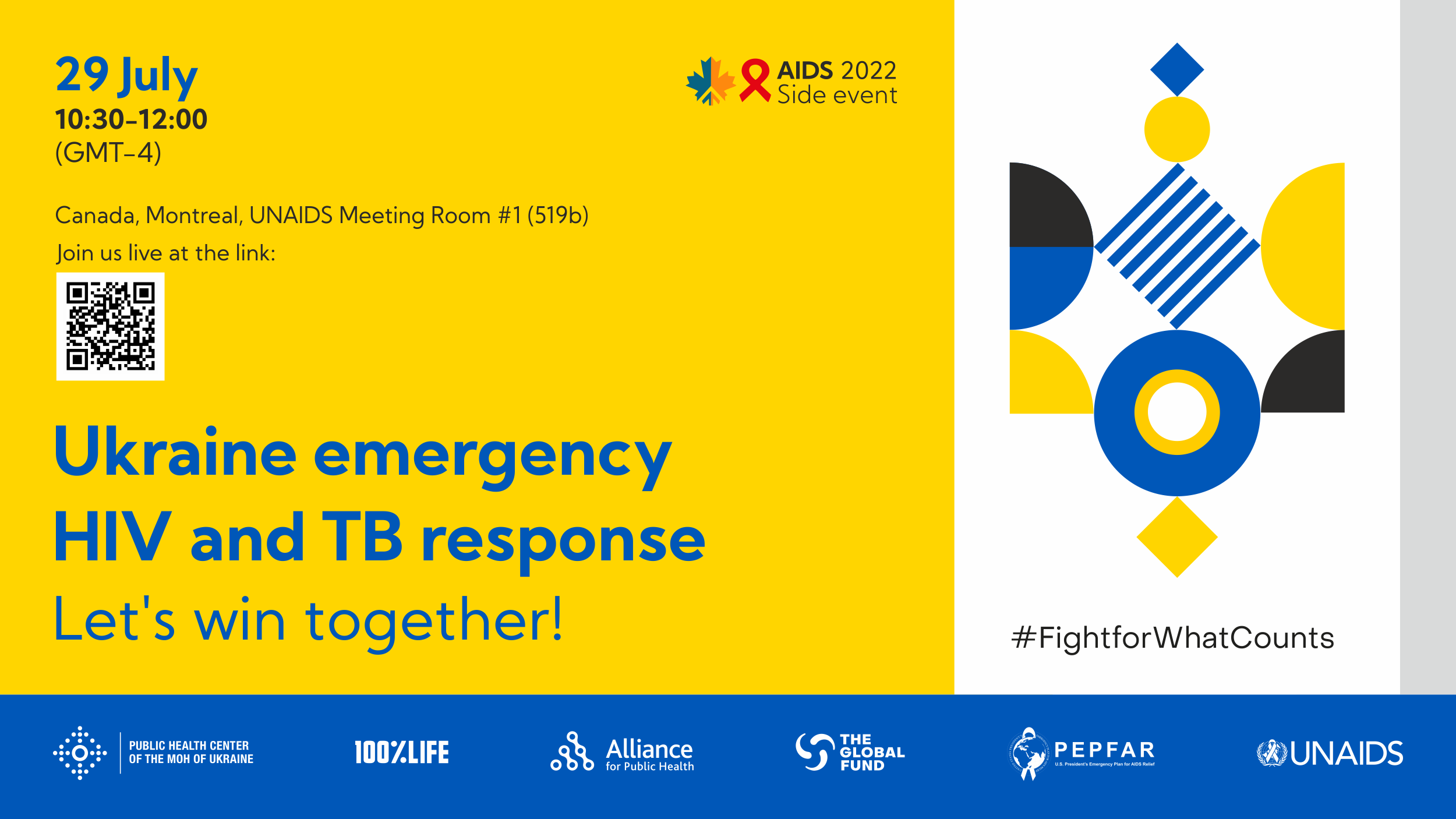
Contact for media: Inna Gavrylova, Senior Communications Manager, Alliance for Public Health, gavrylova@aph.org.ua
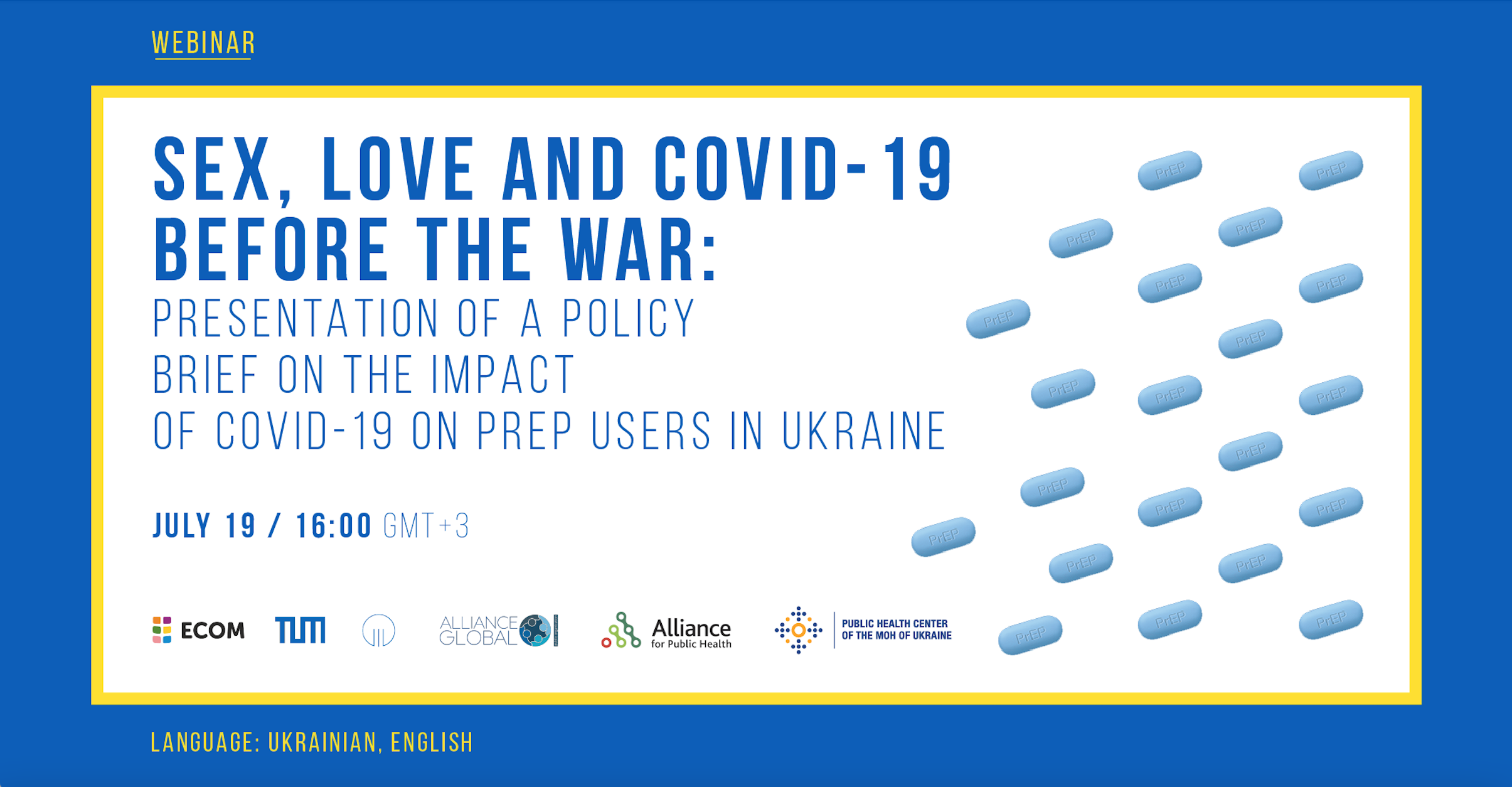
The webinar program:
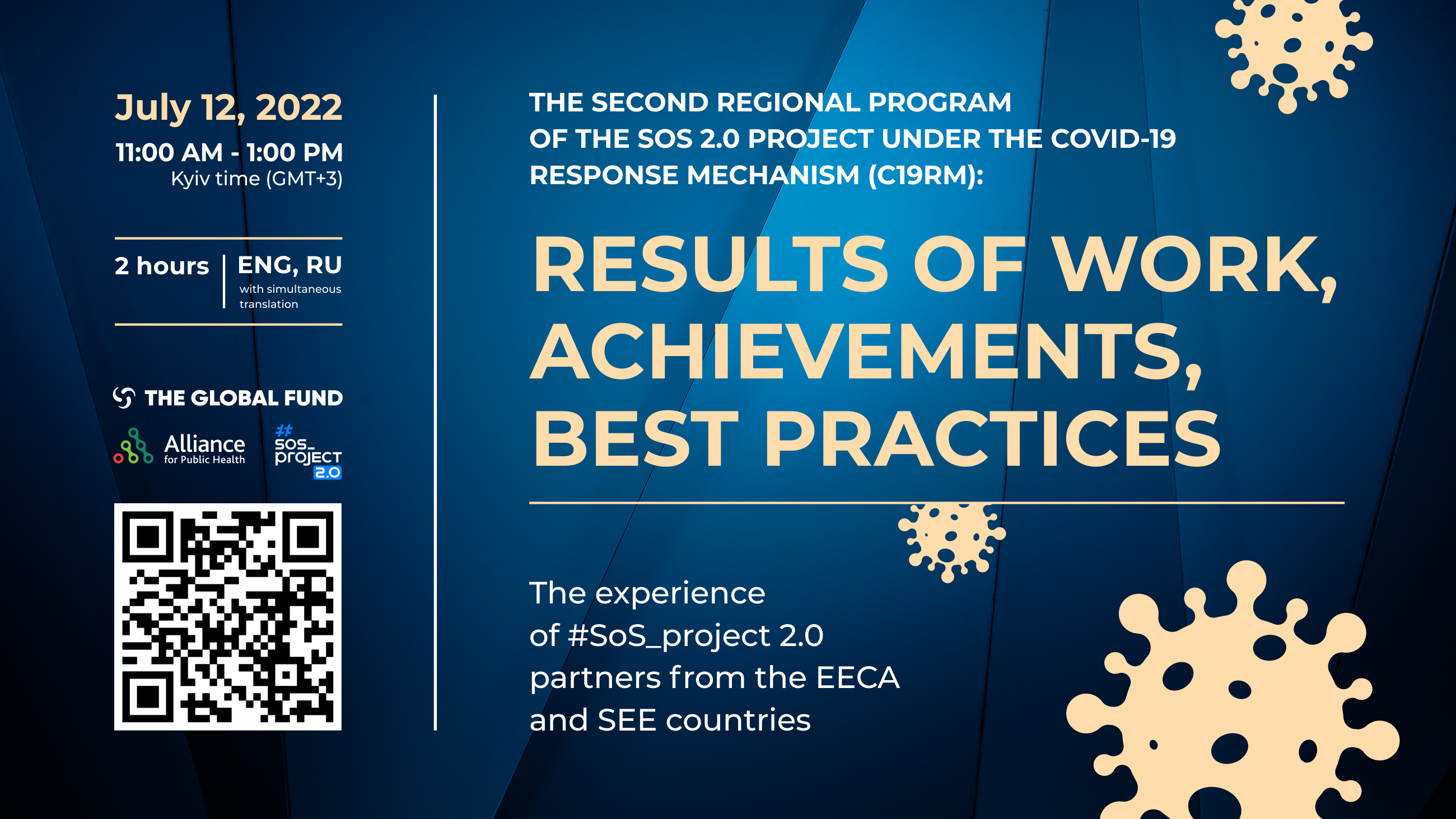
We are pleased to invite you to the webinar ” The second regional program on COVID-19 of the SoS 2.0 project under the COVID-19 response mechanism (C19RM): results of work, achievements, best practices”
Date: July 12, 2022
Time: 11 am – 1 pm Kyiv time (GMT+3)
Join: https://bit.ly/3av14dz
The purpose of the online webinar is to present the results of the work of the second regional program on COVID-19 of the SoS 2.0 project within the framework of the COVID-19 response mechanism (C19RM), which was implemented by project partners in the countries of the EECA region.
Languages: Russian and English (with simultaneous translation)
Presenters
11:00 – 11:10 Welcome and introductions
– Moderator, Nadia Yanhol, Alliance for Public Health, #SoS 2.0
11:10 – 12:55 Presentations and discussions: results of work, achievements, best practices
12:55 – 13:00 Closing remarks
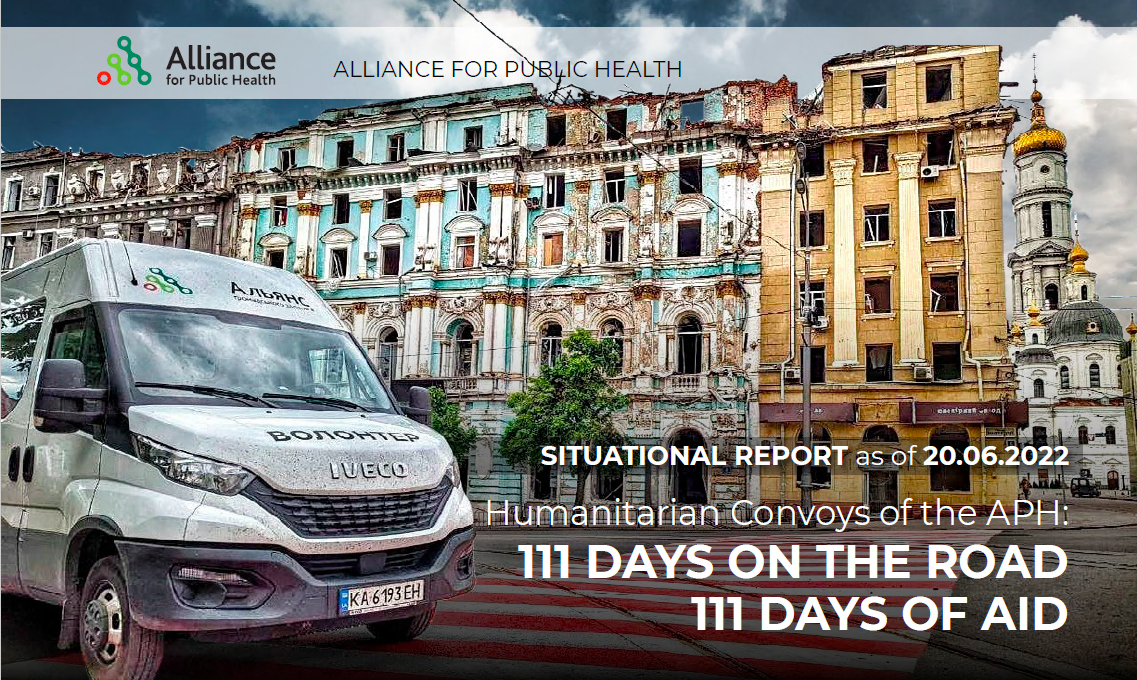
From the first days of the war, the Alliance for Public Health has repurposed its mobile ambulatories to meet humanitarian
needs. Now, these vehicles work around the clock evacuating women and children, delivering food, medicines, power generators, medical devices, equipment and other essential goods!
111 DAYS OF HUMANITARIAN CONVOYS ARE:
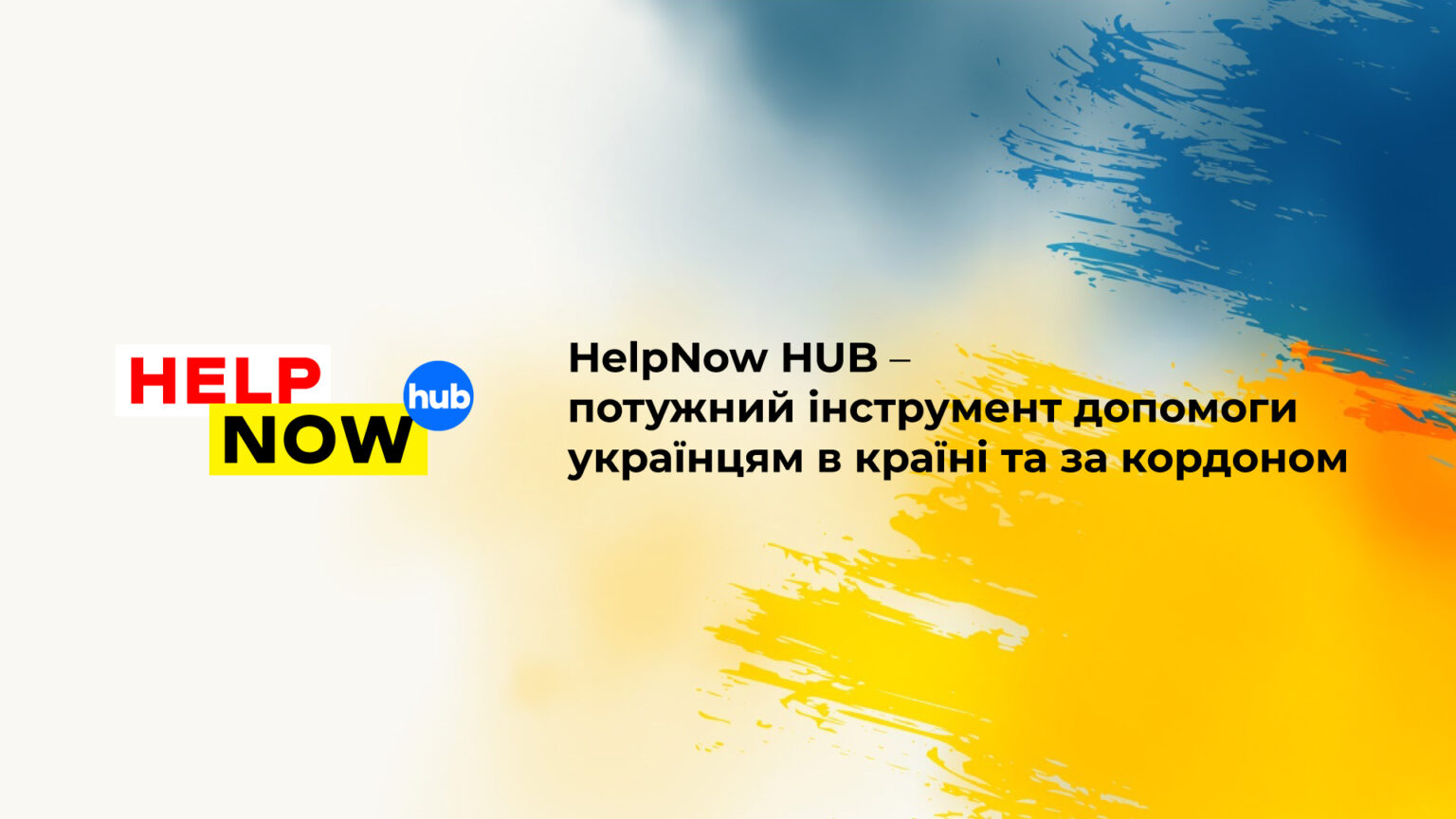
The most demanded in Ukraine and abroad innovative hub #HelpNow https://helpnow.aph.org.ua was discussed on May 31, 2022, during the discussion and presentation “#HelpNow – help that can not wait.”
Almost 400 participants from 10 EECA countries attended the event. They all are concerned about the situation that arose due to the full-scale war in Ukraine. They discussed innovative approaches and responses to new challenges in Ukraine and abroad, i.e., access to treatment, telemedicine, shelters, a hotline for providing information on medicines in any country in the world, as well as humanitarian and social support for key groups affected by the war.
Andreas Tamberg, portfolio manager at the Global Fund, highlighted his commitment to the #HelpNow HUB team, #SoS_project 2.0, and the Alliance for Public Health.
“We are confident that you will achieve significant success not only through our programs but also by helping those you encounter day-to-day.”
“The #SoS 2.0 project is a unique tool of the Global Fund, as it covers a wide range of countries and regions,” Mr. Tamberg said. “It is driven by civil society forces that can apply the maximum flexibility and ability to find those who need services. We greatly appreciate your ability to improve health and save lives where they need to be. As part of the ongoing fighting and mass migration of Ukrainian patients because of the war, it is very encouraging that the Alliance remains in its place, and you are working with refugees, with victims not only in Ukraine but also in various countries of the region.”
Subtitle More than 20 NGOs were involved in creating the HelpNow database system
Serhii Filipovych, director of #SoS 2.0 in the Public Health Alliance, introduced the work of the new HelpNow service and pointed out that in the crisis of russian military aggression in Ukraine, the role of broad interaction and support of friendly countries is significant.
“Since the beginning of the war, the #SoS 2.0 project has immediately become involved in the situation. The geography of our activities has expanded from the 15 countries involved in the project to more than 35 countries worldwide. Foremost, the neighboring countries, starting from the first week of the war, provided great humanitarian assistance to Ukrainians, mainly women with children, from the stage of crossing the border outside Ukraine and continued to create conditions for social and medical assistance and support. I’d also like to note the unique nature of the interaction between organizations, health care institutions, and partner non-governmental organizations. More than 20 NGOs and state institutions were involved in creating an information database and a system of assistance to Ukrainians in different countries,” Sergii Filippovych said in his speech.
With the support of the Global Fund, funds were allocated to create a special program to support Ukrainian patients in distress due to the war. In response to the war challenge, practically on a volunteer basis, the Alliance developed and launched an emergency coordination and information service on treatment in Ukraine and abroad – HelpNow within the framework of the regional project #SoS 2.0. This service provides information that helps Ukrainians access ART, PTAO, TB drugs, viral hepatitis drugs, and psychological assistance in Ukraine and abroad.
Another important achievement of the Alliance was the creation, back in peacetime, of the “Guide for contingency planning in the field of HIV”, which was shared in the public domain for wide use. “Ukraine was not preparing for the war, but we understood that the system of providing assistance to key populations can be very vulnerable in emergencies. Thus, we can already say that we were technically ready and immediately connected to solving problems”, – the project director #SoS 2.0 emphasized.
During the event, participants shared their experiences and developments and discussed critical areas of work and further steps that will help to respond quickly to the challenges during the war, i.e.:
Roman Halevych, UNAIDS Director in Ukraine, highlighted another important step in his speech. There is a need to review and expand HIV services so that people from key communities who had to leave their homes and cities due to russian aggression can receive HIV services in their host places.
In her turn, Vlasta Brodska, Head of the Emergency Response/#SoS 2.0 program, underlined that supporting NGOs in countries with a large concentration of people from Ukraine is essential. These countries are well known, thanks to the data of a coordination service operating in the hub.
Also, as part of the discussion, approaches to providing services in countries hosting Ukrainian refugees were discussed and presented in the example of Moldova, Poland, and Germany. During a separate session, there were presented new forms of communication and exchange of medical information between doctors respecting the patient’s rights. We talked about online counseling of patients on the principle of telemedicine, supporting and strengthening the capacity of clinicians who are involved in the system of medical care for HIV patients in Ukraine in the context of war within the clinical component of HelpNow. There was also raised the issue concerning the operation of shelters created in Ukraine and host countries for forcibly displaced Ukrainians due to the war.

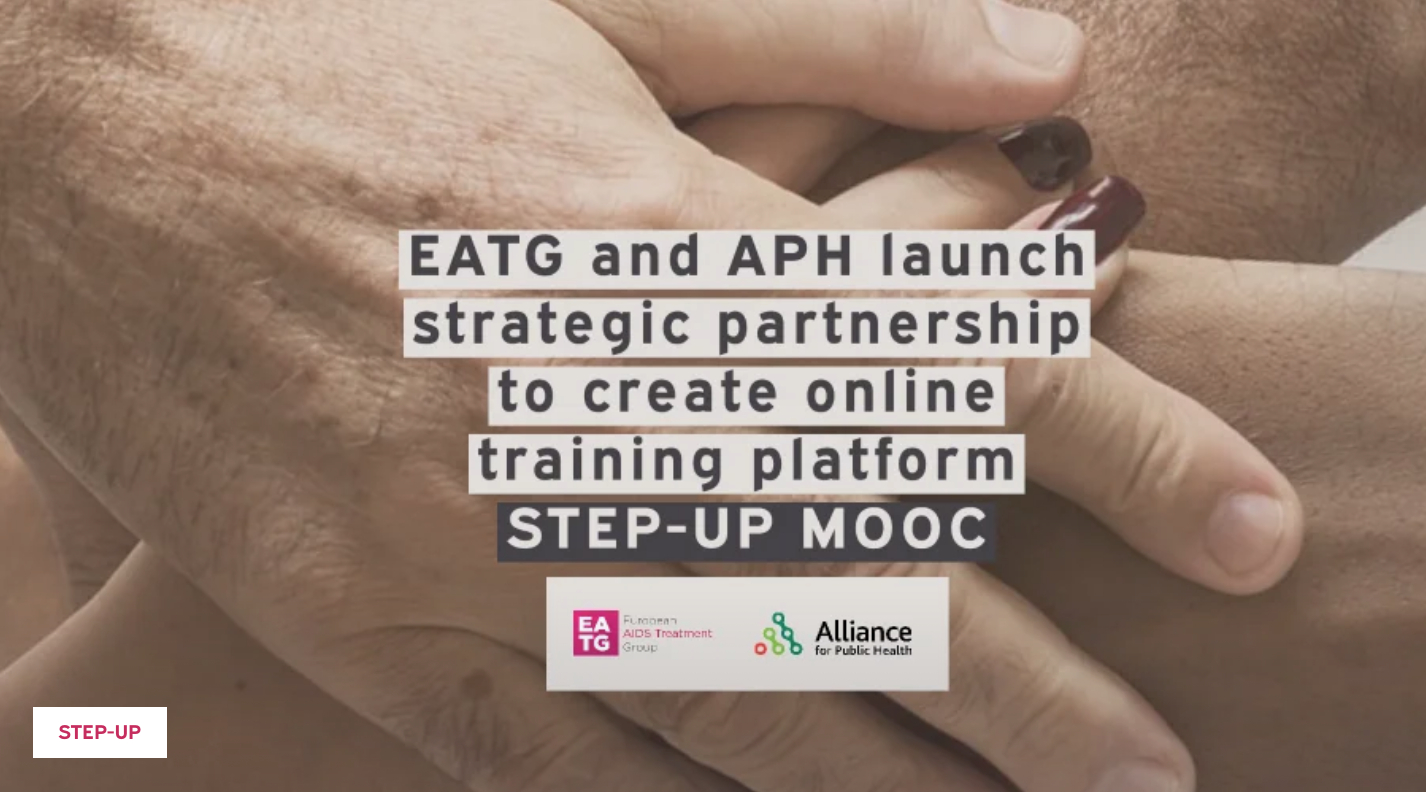
Brussels-Kyiv, June 1st 2022
The European AIDS Treatment Group (EATG) and Alliance for Public Health (APH) launch strategic cooperation focusing on Europe and Central Asia The aim is to set up an online training and capacity building platform for the upcoming cycle of EATG’s acclaimed STEP-UP project.
The STEP-UP Training Academy has been a flagship project of EATG since 2013. After five face-to-face cycles and one online, the new implementation of STEP-UP will be an online training platform created in collaboration with APH. Both the new format and the involvement of a partner organisation from the Eastern Europe and Central Asia (EECA) region aim to assure a wider reach of trainees from diverse settings.
“The focus of STEP-UP has always been to bring activists from across Europe and Central Asia together in view of building their capacities in a manner tailored to local and regional needs. We have witnessed that STEP-UP helps to empower a movement of new HIV activists. Since its inception, more than 120 graduates have benefitted from STEP-UP and some of them were awarded grants to implement small projects; we are proud of their success stories and their evolution” says Pieter Vanholder, Executive Director of EATG. “We are glad we teamed up with APH to build and implement a new cycle of STEP-UP in the format of a Massive Open Online Course (MOOC), adapted to the new reality and flexible to adapt further to emerging needs.”
“We are extremely happy to announce our collaboration with EATG on STEP-UP” says Tetiana Deshko, Director of International Programs in Alliance for Public Health. “The gap in access to antiretroviral treatment is the major shortcoming of HIV response in EECA, with only 53% of those in need of treatment receiving it. As the war on Ukraine and migration have shown, patients’ and their communities’ initiative in proactively seeking treatment is the key to success in treatment initiation and adherence, wherever the patient is either stable or on the move. This collaboration with EATG makes our treatment approaches more integrated and person-centered. STEP-UP is an excellent project that not only provides comprehensive knowledge, it also supports community mobilisation and advocacy to deliver change.”
STEP-UP MOOC is a bilingual (English/Russian) training programme that combines 1) a self-paced e-learning approach using a cascade of trainings for networking, empowerment and advocacy with 2) a face-to-faceCommunity of Practice Workshop and 3) a system of sub-grants. It is targeted to people living with HIV/AIDS, health care providers, civil society representatives and other professionals who work in service delivery and/or advocacy to ensure universal access to combination prevention, HIV treatment and care. The MOOC will be designed by activists for activists, will be free of charge and accessible to everyone.
“Participation in the STEP-UP MOOC will not be based on any selection process, but on willingness to participate. As the contents and languages of the training will be specifically tailored to the needs of HIV activists in WHO Europe, we expect most participants to come from the HIV sector, thus having prior knowledge of HIV and related infections” comment the organisers.
STEP-UP MOOC is planned to be available online in January 2023.
Learn more about STEP-UP: https://www.eatg.org/projects/step-up/
Contacts:
Apostolos Kalogiannis, Communications Coordinator, EATG, apostolos.kalogiannis@eatg.org
Inna Gavrylova, PR & Communications Manager, Alliance for Public Health, gavrylova@aph.org.ua
This initiative has been independently developed by EATG, and was made possible through sponsorship from Gilead Sciences Europe Ltd. EATG acknowledges that Gilead Sciences Europe Ltd has not had any control or input into the structure or content of the initiative. The STEP-UP MOOC is implemented in collaboration with Alliance for Public Health.
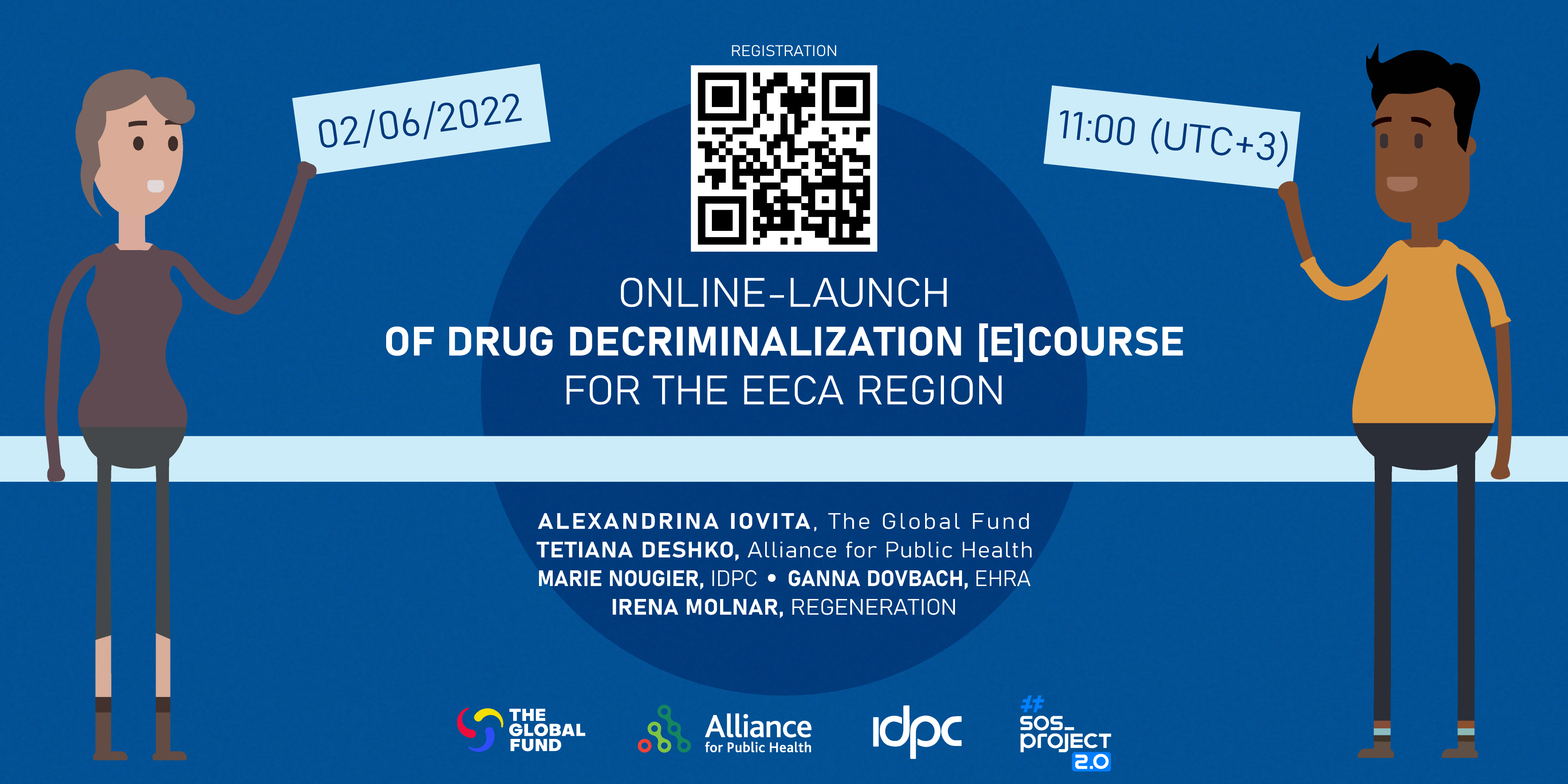
On June 2, 2022 at 11:00 am (UTC+3), #SoS_project 2.0 regional team the Alliance for Public Health and the International Drug Policy Consortium (IDPC) will present a new version of a unique online training course on drug decriminalization for activists in the EECA region.
Zoom registration: https://bit.ly/3sTpjYW
#SoS_project 2.0 regional team has initiated the translation and adaptation of the unique [e]Course into russian to enhance advocacy and support cutting edge knowledge on humane and effective drug policy partners in Eastern Europe and Central Asia. Note that [e]Course was developed and launched in English and French in 2021 by IDPC in partnership with Mainline, Health[e]Foundation and Frontline AIDS.
IDPC’s Drug decriminalisation [e]Course is a free-to-access online learning course that is open to anyone interested in this important topic. With the launch of the Russian version of the course, activists from the countries of Eastern Europe and Central Asia will have access to cutting-edge knowledge in the field of modern approaches.
Presentation speakers:
The [e]Course includes seven modules:
The presentation will also be streamed live on the Alliance for Public Health, IDPC and #SoS_project 2.0 Facebook pages.
Contact: gavrylova@aph.org.ua, Inna Gavrylova, PR & Communications Manager, Alliance for Public Health